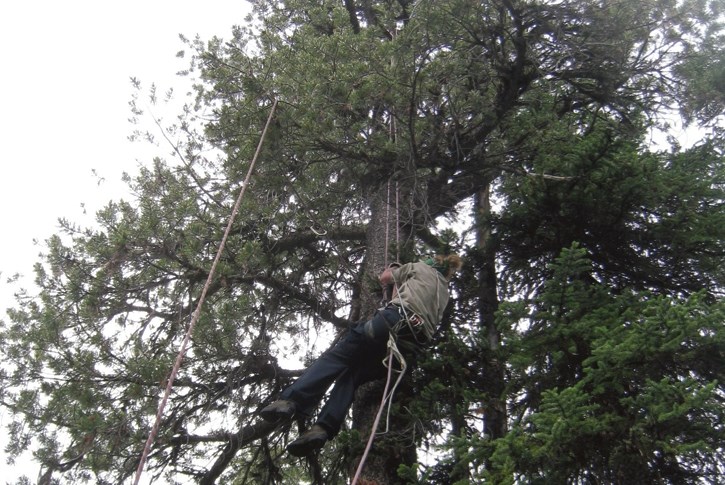Lake Louise Ski Resort is facing charges from Parks Canada in relation to destroying a number of whitebark pine trees, which are federally protected as an endangered species.
The charges were laid by Parks Canada in September last year, according to information presented in Canmore Provincial Court last week.
Specifically, Lake Louise Ski Area is charged with killing or harming an endangered species under the Species at Risk Act, and two charges of contravening regulations of the National Parks Act.
A specially assigned federal Crown prosecutor – Erin Eacott out of Edmonton – has been assigned to the case and it will return to court on Sept. 7 for plea.
Counsel for Lake Louise, Kim Locke, said no plea has been entered yet for the charges and she is still waiting for disclosure from the Crown.
“As I’m sure the court can appreciate, we are not in a position to make a plea,” Locke said.
That disclosure, according to federal Crown prosecutor Anita Szabo, includes the results of a DNA certificate of analysis on the trees.
“The DNA analysis certificate from the samples taken from three specific trees … should be ready shortly,” Szabo told court.
All three charges against Lake Louise stem from a single incident alleged to have occurred between Aug. 12 and Sept. 24, 2013 and involved whitebark pine. The Parks Act charges allege Lake Louise contravened its regulation by removing, defacing, damaging or destroying flora in a national park without a permit and that the company contravened a condition of its lease.
Dan Markham with Lake Louise Ski Resort said the summons to court by Parks Canada resulted after staff with the ski area and Parks were on a hike near the top of the company’s leasehold area in the summer of 2014 when they noticed trees had been “brushed,” but the number, species and timing were not determined at that time.
“LLSA has been working with Parks Canada during the entire process to determine all of the facts and will continue to do so until the situation is resolved,” Markham wrote in an email statement. “At the Lake Louise Ski Resort, we take national park and environmental stewardship best practices very seriously, and we have a stringent and highly regarded environmental program. We work with Parks Canada (PC), and with other conservation partners and experts, closely and consistently.
“On the LLSA leasehold, brushing of vegetation occurs for various reasons, including as required in our operating lease, relating to aspects such as skier safety, and including by a number of third parties if reason warrants, such as for community-based infrastructure purposes like power and telecommunications. There are special considerations that must be in place when a Species at Risk Act species might be affected.”
Whitebark pine is considered an important tree which stabilizes steep slopes, influences the amount of snow melt by sustaining snow drifts, and provides critical food, cover and shelter for many species of wildlife.
The tree, which has evolved over time to become an important tree of the high elevation forests along the Rocky and Columbia Mountain chains, is listed as endangered under the Species At Risk Act (SARA).
Scientists say the survival of whitebark pine has been threatened by the combined effects of fire suppression, climate change, mountain pine beetle outbreaks and a disease known as white pine blister rust.
It is found in seven of Canada’s national parks: Mount Revelstoke, Glacier, Jasper, Banff, Kootenay, Yoho and Waterton Lakes.
As hardy as whitebark pine is, it is declining throughout its range, including within the mountain national parks of Banff, Kootenay, Yoho Jasper, Mount Revelstoke-Glacier and Waterton Lakes.
Parks Canada officials say they are unable to comment on the Lake Louise case.
“Parks Canada is a world leader in conservation and takes the protection of the resources under its care very seriously,” said Tania Peters, a spokeswoman for Lake Louise, Yoho and Kootenay.
“It would not be appropriate to comment as the matter is before the courts.”




